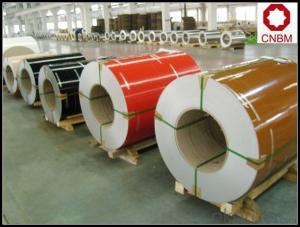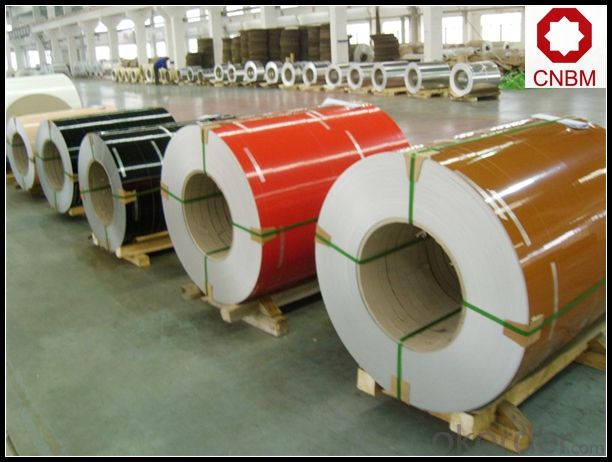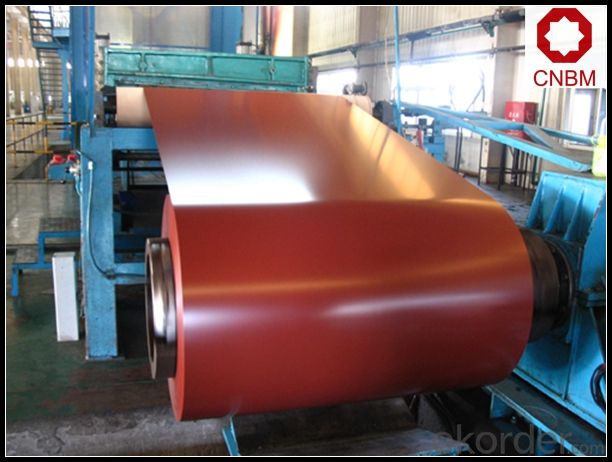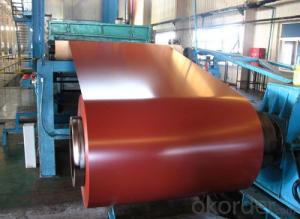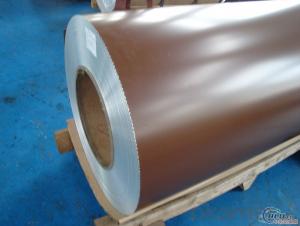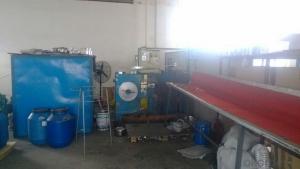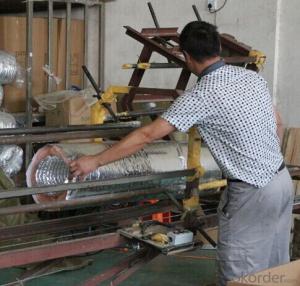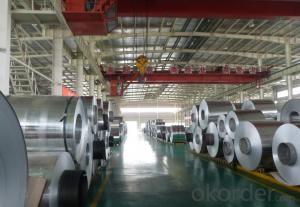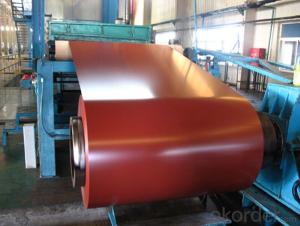Aluminum Coils/Sheets - PE/PVDF Color Coated Aluminum Coil for Shutter Decoration
- Loading Port:
- Shanghai
- Payment Terms:
- TT or LC
- Min Order Qty:
- 5 m.t.
- Supply Capability:
- 10000 m.t./month
OKorder Service Pledge
OKorder Financial Service
You Might Also Like
Specification
1. Specification of PE/PVDF Color Coated Aluminum Coil for Shutter Decoration
Alloy: 1050, 1060, 1100, 3003, 3004, 3005, 3105, 5005, 5052, 5083, 5754
2) Temper: Various status
3) Thickness: 0.3-150mm
4) Width: 300-1950mm
5) Length: Under9500mm/ Coil
6) Weight: 2.5-5.0 tons per coil
7) Dimensions and weight can be produced according to clients' specifications.
8) Inner Diameter: 505mm, 605mm
9) Packing: Export standard, wooden pallet.
10) Delivery time: 20 days
11) Minimum order quantity: 5 tons per size.
12) The term of payment: T/T, irrevocable L/C at sight.
13) Surface: Bright
14)Origin: China
2. Application of PE/PVDF Color Coated Aluminum Coil for Shutter Decoration
(1).Interior: wall cladding, ceilings, bathrooms, kitchens and balconies, shutters, doors...
(2).Exterior: wall cladding, facades, roofing, canopies, tunnels,column covers , renovations...
(3).Advertisement: display platforms, signboards, fascia, shop fronts...
3. Feature of PE/PVDF Color Coated Aluminum Coil for Shutter Decoration
*Such coil is specially designed to replace aluminum ingot, due to the high export tax of aluminum ingot, the coil has better price than ingot.
*This type of coil can fit customer's remelting furnace just like ingot, no need to make any change to the production line that was previously used for ingot. The standard coil size and weight is very suitable for the feed gate of furnace.
*This type of coil causes less material wastage than ingot when remelted.
*Our coil is made directly from ore, no need to go though the ingot making process, quality is much better than other suppliers who use ingot scrap to make coil.
Be free from Oil Stain, Dent, Inclusion, Scratches, Stain, Oxide Dicoloration, Breaks, Corrosion, Roll Marks, Dirt Streaks and other defect which will interfere with use
4. Certificate:
SGS and ROHS(if client request, paid by client), MTC(plant provided), Certificate of Origin(FORM A, FORM E, CO), Bureau Veritas and SGS (if client request, paid by client), CIQS certificate
5. Image of PE/PVDF Color Coated Aluminum Coil for Shutter Decoration
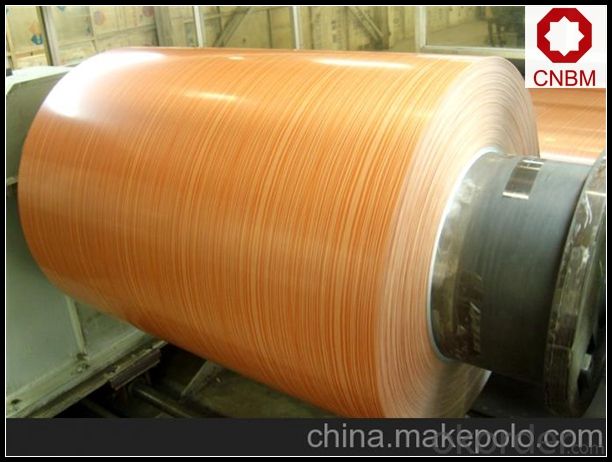
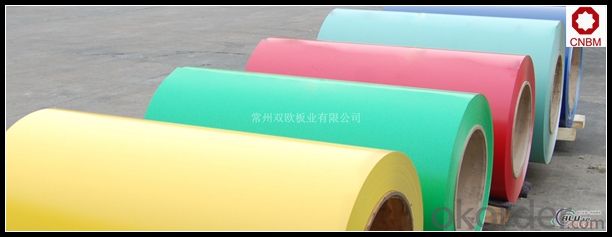
6. Package and shipping of PE/PVDF Color Coated Aluminum Coil for Shutter Decoration
eye to wall
eye to the wall
with wood pallet (wooded case also available)
7. FAQ
1) What is the delivery time?
Dpends on actual order, around 20 to 35 days
2)What is the QC system:
We have QC staff of 20 persons and advanced equipment, each production is with MTC traced from Aluminum ingot lot.
3) What market do you mainly sell to?
Australia, America, Asia, Middle East, Western Europe, Africa etc
"Aluminum roll rolling machine after rolling, corner after processing, metal products for flying shears.Aluminium coil are widely used in electronics, packaging, construction, machinery, etc., more aluminum volume production enterprises in China, production technology has catch up with the developed countries, according to the aluminum volume contains metal elements, aluminum volume probably can be divided into nine categories, respectively is 1000 series 1000 series, 2000 series aluminum plate, aluminum plate, 4000 series aluminum, 5000 series, 6000 series, 7000 series, 8000 series, 9000 series.Silicon have a corrosion effect on carbide.Although generally called more than 12% Si aluminum alloy high silicon aluminum alloy, it is recommended to use diamond tool, but this is not absolute, increasing silicon content on the destructive force of the cutting tool is gradually increasing.So some vendors in silica content more than 8% when diamond tool is recommended.
"
- Q: What are the potential applications of anodized aluminum coils?
- Anodized aluminum coils possess a multitude of possible uses across various industries. The construction industry heavily relies on anodized aluminum coils, utilizing them for cladding and façade systems. The anodized coating enhances the aluminum's durability, weather resistance, and aesthetic appeal. Its ability to withstand harsh environmental conditions, such as UV radiation, saltwater exposure, and extreme temperatures, makes it an optimal choice for building exteriors. The automotive industry also benefits significantly from anodized aluminum coils. The anodized coating adds a protective layer that enhances the aluminum's corrosion resistance, making it suitable for a wide range of automotive components. These coils can be used for trim, body panels, window frames, and other parts that require both durability and an attractive appearance. Consumer electronics manufacturing also utilizes anodized aluminum coils due to their scratch resistance, electrical insulation, and heat dissipation properties. The anodized coating makes it suitable for electronic enclosures, heat sinks, and connectors. Moreover, the ability to achieve vibrant colors through anodization allows for customizable designs that appeal to consumers. The heating, ventilation, and air conditioning (HVAC) industry extensively uses anodized aluminum coils due to their lightweight nature and excellent heat conductivity. Heat exchangers, air conditioning coils, and evaporator coils commonly utilize these coils. The anodized coating provides protection against corrosion caused by moisture and other environmental factors, ensuring the longevity and efficiency of these HVAC components. Furthermore, the food and beverage industry finds applications for anodized aluminum coils due to the hygienic surface provided by the anodized coating. It is easy to clean and resistant to bacterial growth, making it suitable for food processing equipment, storage tanks, and packaging materials. This ensures the safety and quality of the products. In conclusion, anodized aluminum coils possess vast and diverse potential applications, ranging from construction and automotive to electronics and food processing. The unique combination of durability, corrosion resistance, heat dissipation, and aesthetic appeal makes anodized aluminum coils a versatile material that finds use in numerous industries.
- Q: What are the transportation and storage requirements for aluminum coils?
- There are several factors that determine the transportation and storage requirements for aluminum coils. Firstly, it is crucial to handle the coils with caution during transportation in order to avoid any harm. Secure packaging is necessary to prevent potential scratches, dents, or deformation. Additionally, safeguarding the coils from moisture is essential as exposure to water or high levels of humidity can result in corrosion. During transportation, it is advisable to employ appropriate vehicles or containers that can sufficiently support the weight and dimensions of the aluminum coils. The coils should be firmly secured to prevent any movement or shifting that may cause damage. Regarding storage, it is of utmost importance to store aluminum coils in an area that is clean, dry, and well-ventilated. Ideally, the storage facility should maintain a stable temperature and humidity level to prevent any negative effects on the coils. If the coils are stored outside, they should be adequately covered and protected from direct sunlight, rain, and other weather conditions. Furthermore, it is crucial to store aluminum coils away from any substances or chemicals that may cause damage. They should be stored in a manner that prevents contact with other materials, as physical contact can lead to scratching or other types of damage. In summary, the transportation and storage requirements for aluminum coils involve careful handling, protection from moisture and corrosive materials, proper packaging and securing during transportation, and storage in a clean and suitable environment. By adhering to these guidelines, the integrity of the aluminum coils can be preserved, ensuring their quality and usability.
- Q: This question asks for a comparison of the benefits and drawbacks of utilizing spring steel wire coils.
- <p>Spring steel wire coils offer several advantages such as high strength and durability, making them ideal for applications requiring resilience and resistance to deformation. They are also known for their excellent elasticity, which allows for consistent performance in dynamic applications. Additionally, spring steel wire coils can be easily formed into various shapes, providing versatility in design and functionality. However, they also have disadvantages, including potential for corrosion if not properly treated, and they can be more expensive than other types of wire due to the material's properties. Furthermore, spring steel wire coils may require specialized tools and equipment for handling and installation, adding to the cost and complexity of their use.</p>
- Q: What are the safety considerations when handling aluminum coils?
- When handling aluminum coils, there are several safety considerations that need to be taken into account. Firstly, it is important to understand that aluminum coils can be quite heavy, especially when dealing with larger sizes. Therefore, proper lifting techniques should be used to avoid strain or injury to the back and muscles. This may involve using lifting aids or getting assistance from others when moving or positioning the coils. Secondly, aluminum coils can have sharp edges or corners, which can cause cuts or puncture wounds if not handled carefully. It is advisable to wear appropriate personal protective equipment, such as gloves, when handling the coils to protect against any potential injuries. Additionally, aluminum is a highly conductive material for electricity and heat. Therefore, it is crucial to ensure that the coils are not in contact with any live electrical sources or exposed to open flames or intense heat. This can help prevent electrical shocks or fires, which could pose significant safety risks. Furthermore, proper storage and stacking of aluminum coils is essential to prevent accidents. Coils should be stored in a stable and secure manner, ensuring that they are not at risk of falling or rolling over. Proper stacking techniques, such as using appropriate supports or pallets, should be employed to prevent them from toppling over. Lastly, it is important to be aware of any specific safety guidelines or regulations provided by the manufacturer or relevant authorities when handling aluminum coils. Following these guidelines can help ensure the safe handling and use of the coils and minimize the risk of accidents or injuries. In conclusion, the safety considerations when handling aluminum coils include using proper lifting techniques, wearing personal protective equipment, avoiding contact with electrical sources and heat, ensuring proper storage and stacking, and following manufacturer guidelines. By taking these precautions, the risk of accidents or injuries can be significantly reduced.
- Q: This question is asking for a comparison of various types of aluminum coils, highlighting their unique characteristics and uses.
- <p>Aluminum coils are differentiated by their thickness, alloy composition, surface treatment, and temper. Common types include 1000 series coils with high purity, 3000 series known for formability, 5000 series for corrosion resistance, and 6000 series for strength. Thickness varies from thin gauges used in packaging to thick ones for construction. Surface treatments can include anodizing, painting, or lacquering for enhanced properties. Temper refers to the hardness and strength, with 'H' for hard and 'O' for soft tempers. Each type serves specific industries, such as automotive, aerospace, construction, and packaging.</p>
- Q: How long do aluminum coils last?
- The longevity of aluminum coils can differ based on various factors including maintenance, usage, and environmental conditions. On average, aluminum coils that are well-maintained can endure for approximately 15 to 20 years. Nevertheless, with appropriate care and consistent cleaning, certain aluminum coils have been reported to endure even longer, reaching up to 30 years or beyond. It is crucial to emphasize that regular upkeep, such as coil cleaning, inspection for damage or corrosion, and ensuring proper airflow, can greatly increase the lifespan of aluminum coils. Furthermore, elements like exposure to severe weather conditions, levels of humidity, and the quality of installation can also have an impact on the durability of aluminum coils.
- Q: What are the different types of surface treatments for aluminum coils?
- There are several different types of surface treatments available for aluminum coils. These treatments are designed to enhance the appearance, durability, and corrosion resistance of the aluminum. 1. Anodizing: This is a popular surface treatment method that involves creating a protective oxide layer on the surface of the aluminum. Anodizing can be done in various colors, which adds aesthetic value to the coils. It also improves resistance to corrosion and wear. 2. Painting: Aluminum coils can be coated with high-quality paints to provide a decorative and protective finish. The paint can be applied in a wide range of colors and finishes, such as matte, gloss, or metallic. Painting not only enhances the appearance but also provides additional protection against corrosion and UV rays. 3. Powder Coating: This is a process in which a dry powder is applied electrostatically to the aluminum coils and then cured under heat. Powder coating provides a durable and attractive finish that is resistant to chipping, scratching, and fading. It is available in a wide variety of colors and textures. 4. Chemical Conversion Coating: This treatment involves applying a chemical solution to the aluminum surface, which creates a thin layer of protective coating. The conversion coating improves the corrosion resistance of the aluminum and also provides a good base for subsequent paint or powder coating. 5. Brushing: Brushing is a mechanical surface treatment that involves using abrasive brushes to create a textured finish on the aluminum coils. This process can be used to achieve a brushed or satin-like appearance, which adds a unique aesthetic appeal to the coils. 6. Embossing: Embossing involves creating raised patterns or textures on the surface of the aluminum coils. This treatment not only enhances the visual appeal but also improves the strength and stiffness of the aluminum. Embossed coils are often used in architectural and decorative applications. Overall, the choice of surface treatment for aluminum coils depends on the specific requirements and desired appearance. Each treatment offers its own unique benefits in terms of durability, corrosion resistance, and aesthetic appeal.
- Q: I have aluminum windows that have to be replaced due to bad thermopanes - there is accumulated grime and humidity in between the panes. Is it possible to buy individual custom-sized replacements or do I have to get all new windows and frames? Any referrals would be helpful.
- New windows aren't that expensive. They are plastic now because they insulate better. You just cut around the frame with a skill saw and leave the flange in place. pull out the old window and nail or screw the new frome on the outside of the wall use caulking and new trim boards. Just do one at a time as you can afford it.
- Q: Is it possible to utilize aluminum coils in the production of baking pans or trays?
- <p>Yes, aluminum coils are commonly used for making baking pans and trays due to their excellent heat conductivity, lightweight, and durability. Aluminum's non-reactive nature also makes it safe for food contact. However, it's crucial to ensure that the aluminum is food-grade and that the manufacturing process adheres to safety standards to prevent any health risks.</p>
- Q: Can aluminum coils be used for solar panel applications?
- Yes, aluminum coils can be used for solar panel applications. They are often utilized as the base material for solar panels due to their lightweight, corrosion-resistant, and durable properties. Additionally, aluminum coils offer good thermal conductivity, enabling efficient heat dissipation in solar panels.
Send your message to us
Aluminum Coils/Sheets - PE/PVDF Color Coated Aluminum Coil for Shutter Decoration
- Loading Port:
- Shanghai
- Payment Terms:
- TT or LC
- Min Order Qty:
- 5 m.t.
- Supply Capability:
- 10000 m.t./month
OKorder Service Pledge
OKorder Financial Service
Similar products
Hot products
Hot Searches
Related keywords
